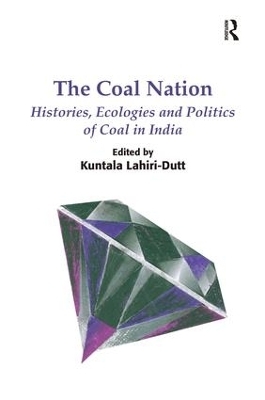
The Coal Nation
Routledge (Verlag)
978-1-4724-2470-9 (ISBN)
Social science research is emerging on a range of issues around large and small-scale mining, connecting them to broader social, cultural, political, historical and economic factors rather than purely measuring the environmental impacts of mining. Within this broader context of global scholarly attention on extractive industries, this book explores two specific contexts: the cultural politics of coal and coal mining, within the context of one particular country, India, which is the third largest coal producer in the world. Both contexts are special; with its separate Ministry, coal occupies pride of place in contemporary India, shaping the energy future and influencing the economic and political milieu of the country. The supremacy attributed to coal mining in contemporary India represents how ’coal nationalism’ has replaced ’coal colonialism’ in the country, turning this commodity into an icon, a national symbol. In recent years the extraction of coal in forest-covered resource peripheries has dispossessed and pauperised many tribal and rural communities who have used these resource-rich lands for their livelihoods for generations. The combustion of coal to produce electricity constitutes the compelling need, and the factor that prevents the Indian state from fully engaging with the impending realities of a climate-changed future. All these reasons make the timing of this book of crucial importance. In particular, The Coal Nation explores the complex history of coal in India; from its colonial legacies to contemporary cultural and social impacts of mining; land ownership and moral resource rights; protective legislation for coal as well as for the indigenous and local communities; the question of legality, illegitimacy and illicit mining and of social justice. Presenting cutting-edge multidisciplinary social science research on coal and mining in India, The Coal Nation initiates a productive dialogue amongst academics and between them and activists.
Kuntala Lahiri-Dutt is a Senior Fellow at the Resource, Environment and Development group at the Crawford School of Public Policy, ANU College of Asia and the Pacific, The Australian National University. Dr Lahiri-Dutt has written widely on mining and related issues; these were published in Gender, Place and Culture, South Asia, South Asian History and Culture, Natural Resources Forum, Development, Economic and Political Weekly among others.
Chapter 1 Introduction to Coal in India: Energising the Nation, Kuntala Lahiri-Dutt; Part II Justice, Legality and History; Chapter 2 Between Informal Legitimacy and Illegality: Coal Mining at the Limits of Justice 1 A version of this Chapter first appeared in Economic and Political Weekly, on 8 December 2007. I thank the Editor of EPW for his permission to use this revised version., Kuntala Lahiri-Dutt; Chapter 3 Coal in Colonial Assam: Exploration, Trade and Environmental Consequences, Arupjyoti Saikia; Chapter 4 Border Mining: State Politics, Migrant Labour and Land Relations along the India-Bangladesh Borderlands, Debojyoti Das; Chapter 5 Slaughter Mining and the ‘Yielding Collier’: The Politics of Safety in the Jharia Coalfields 1895–1950, Dhiraj Kumar Nite; Chapter 6 Stranded Between the State and the Market: ‘Uneconomic’ Mine Closure in the Raniganj Coal Belt 1 An earlier version of this paper was published in Economic and Political Weekly. I thank the Editor of EPW for his permission to publish the revised version., Kuntala Lahiri-Dutt; Part IIa Mining Displacement and Other Social Impacts; Chapter 7 World Bank, Coal and Indigenous Peoples Lessons from Parej East, Jharkhand, Tony Herbert, Kuntala Lahiri-Dutt; Chapter 8 ‘Captive’ Coal Mining in Jharkhand: Taking Land from Indigenous Communities, Kuntala Lahiri-Dutt, Radhika Krishnan, Nesar Ahmad; Chapter 9 Coal Mining in Northeastern India in the Age of Globalisation 1 A different version of the article was published online on the India Environment Portal, http://indiaenvironmentportal.org.in/files/Dr%20walter%20fernandes.doc, Accessed 21 May 2013., Walter Fernandes, Gita Bharali; Chapter 10 Marginalising People on Marginal Commons: The Political Ecology of Coal in Andhra Pradesh, Patrik Oskarsson; Chapter 11 Water Worries in a Coal Mining Community: Understanding the Problem from the Community Perspective, Prajna Paramita Mishra; Chapter 12 Gender in Coal Mining Induced Displacement and Rehabilitation in Jharkhand, Nesar Ahmad, Kuntala Lahiri-Dutt; Part III Social Perspectives to Inform Mining Policy; Chapter 13 Colonial Legislation in Postcolonial Times, Nesar Ahmad; Chapter 14 On the States’ Ownership and Taxation Rights over Minerals in India, Amarendra Das; Chapter 15 Key Policy Issues for the Indian Coal-Mining Industry 1 We acknowledge financial support for some of this work through the Harvard Kennedy School’s project on Energy Technology Innovation Policy, from the David & Lucile Packard Foundation; a gift from Shell Exploration and Production; and general support grants from BP Alternative Energy and Carbon Mitigation Initiative. AC notes that the views expressed in this Chaptere his alone and that they do not reflect the views of ICF International., Ananth Chikkatur, Ambuj Sagar;
| Erscheint lt. Verlag | 11.4.2014 |
|---|---|
| Verlagsort | London |
| Sprache | englisch |
| Maße | 156 x 234 mm |
| Gewicht | 800 g |
| Themenwelt | Geisteswissenschaften ► Geschichte ► Regional- / Ländergeschichte |
| Naturwissenschaften ► Biologie ► Ökologie / Naturschutz | |
| Naturwissenschaften ► Geowissenschaften ► Geografie / Kartografie | |
| Sozialwissenschaften ► Politik / Verwaltung | |
| Sozialwissenschaften ► Soziologie | |
| Technik ► Bergbau | |
| Technik ► Elektrotechnik / Energietechnik | |
| Technik ► Umwelttechnik / Biotechnologie | |
| ISBN-10 | 1-4724-2470-0 / 1472424700 |
| ISBN-13 | 978-1-4724-2470-9 / 9781472424709 |
| Zustand | Neuware |
| Informationen gemäß Produktsicherheitsverordnung (GPSR) | |
| Haben Sie eine Frage zum Produkt? |
aus dem Bereich


